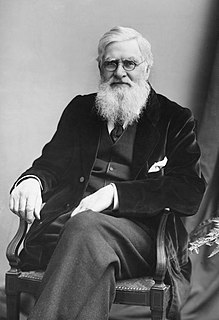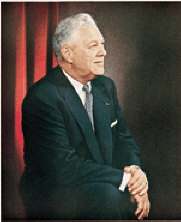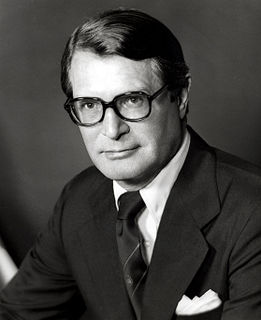A Quote by Thomas Jefferson
I do believe that General Washington had not a firm confidence in the durability of our government. He was naturally distrustful of men, and inclined to gloomy apprehensions; and I was ever persuaded that a belief that we must at length end in something like a British constitution, had some weight in his adoption of the ceremonies of levees, birthdays, pompous meetings with Congress, and other forms of the same character, calculated to prepare us gradually for a change which he believed possible, and to let it come on with as little shock as might be to the public mind.
Quote Topics
Adoption
Belief
Believe
Believed
Birthdays
British
British Constitution
Calculated
Ceremonies
Change
Character
Come
Confidence
Congress
Constitution
Durability
End
Ever
Firm
Forms
General
Gloomy
Government
Gradually
Had
His
Inclined
Length
Levees
Like
Little
Meetings
Men
Might
Mind
Must
Naturally
Other
Our
Persuaded
Pompous
Possible
Prepare
Public
Same
Shock
Some
Something
Us
Washington
Weight
Which
Related Quotes
I am persuaded, from all the facts that have come to me, that it would have been possible, if we had functioned as the Lord intended us to function, if we had paid our tithes and our offerings as the Lord intended us to pay them, we might have gone on without one dollar from our federal government. And has it ever occurred to you what a mighty influence we should have exercised for good and for respect and for all of the virtues that we have been taught, and that God has commanded us to exercise and cultivate and practice, if we had just followed along what he has asked us to do?
There might have been a hundred or a thousand life-bearing planets, had the course of evolution of the universe been a little different, or there might have been none at all. They would probably add, that, as life and man have been produced, that shows that their production was possible; and therefore, if not now then at some other time, if not here then in some other planet of some other sun, we should be sure to have come into existence; or if not precisely the same as we are, then something a little better or a little worse.
In these sentiments, sir, I agree to this Constitution, with all its faults, if they are such; because I think a General Government necessary for us, and there is no form of government, but what may be a blessing to the people if well administered; and believe further, that this is likely to be well administered for a course of years, and can only end in despotism, as other forms have done before it, when the people shall become so corrupted as to need despotic government, being incapable of any other.
This rationale, which justified the mixed constitution of Great Britain, might have made some sense in 1776, but by 1787 most American thinkers had come to believe that all parts of their balanced governments represented in one way or another the sovereign people. They had left the Aristotelian idea of mixed estates - monarchy, aristocracy, and democracy - way behind. [John] Adams had not, and his stubbornness on this point caused him no end of trouble.
Man is the same today that he has always been. He is a rebel against God. He may, in some generations, hide his rebellion a little more carefully than at other times, but there is no change in his heart. The men who builded the city against God back in the days of Babylon had the same hatred as that which possessed the men who nailed the Lord Jesus Christ to the cross.
Of course my moods change, but the average is serenity. I have a firm faith in art, a firm confidence in its being a powerful stream which carries a man to a harbor, though he himself must do his bit too; at all events, I think it such a great blessing when a man has found his work that I cannot count myself among the unfortunate. I mean, I may be in certain relatively great difficulties, and there may be gloomy days in my life, but I shouldn't like to be counted among the unfortunate, nor would it be correct if I were.
At no time during the period intervening between the ratification of the Constitution and the inauguration of the new government were the leaders in Federalism certain that the agrarian party, which had opposed the Constitution, might not render the instrument ineffectual by securing possession of Congress.
It is often asserted that as woman has always been man's slave--subject--inferior--dependent, under all forms of government and religion, slavery must be her normal condition. This might have some weight had not the vast majority of men also been enslaved for centuries to kings and popes, and orders of nobility, who, in the progress of civilization, have reached complete equality.
It is not enough for us to know what is right and to believe it is good. We must be willing to stand up and be counted. We must be willing to act in accordance with what we believe under all circumstances. It is of little value for us to believe one way if we behave contrary to that belief in our private actions or in our public performance.
I think that you're smarter than we were, but we had two things: one is, in our naïveté we believed we could change the world. And number two, we believed that another world was possible. And once that belief took hold of some critical mass, a tiny minority nonetheless, but a critical mass of people, then the world did change.
As belief shrinks from the world, it is more necessary than ever that someone believe. Wild-eyed men in caves. Nuns in black. Monks who do not speak. We are left to believe. Fools, children. Those who have abandoned belief must still believe in us. They are sure they are right not to believe but they know belief must not fade completely. Hell is when no one believes.
The other General Welfare Clause is in the first of the authorities given to the Congress and it's not a grant, it's a restriction. By which I mean it doesn't say Congress can legislate for the general welfare, it means that everything Congress must do has to enhance the general welfare of the United States of America. It can't grant things to individuals, it can only legislate for the government.


































